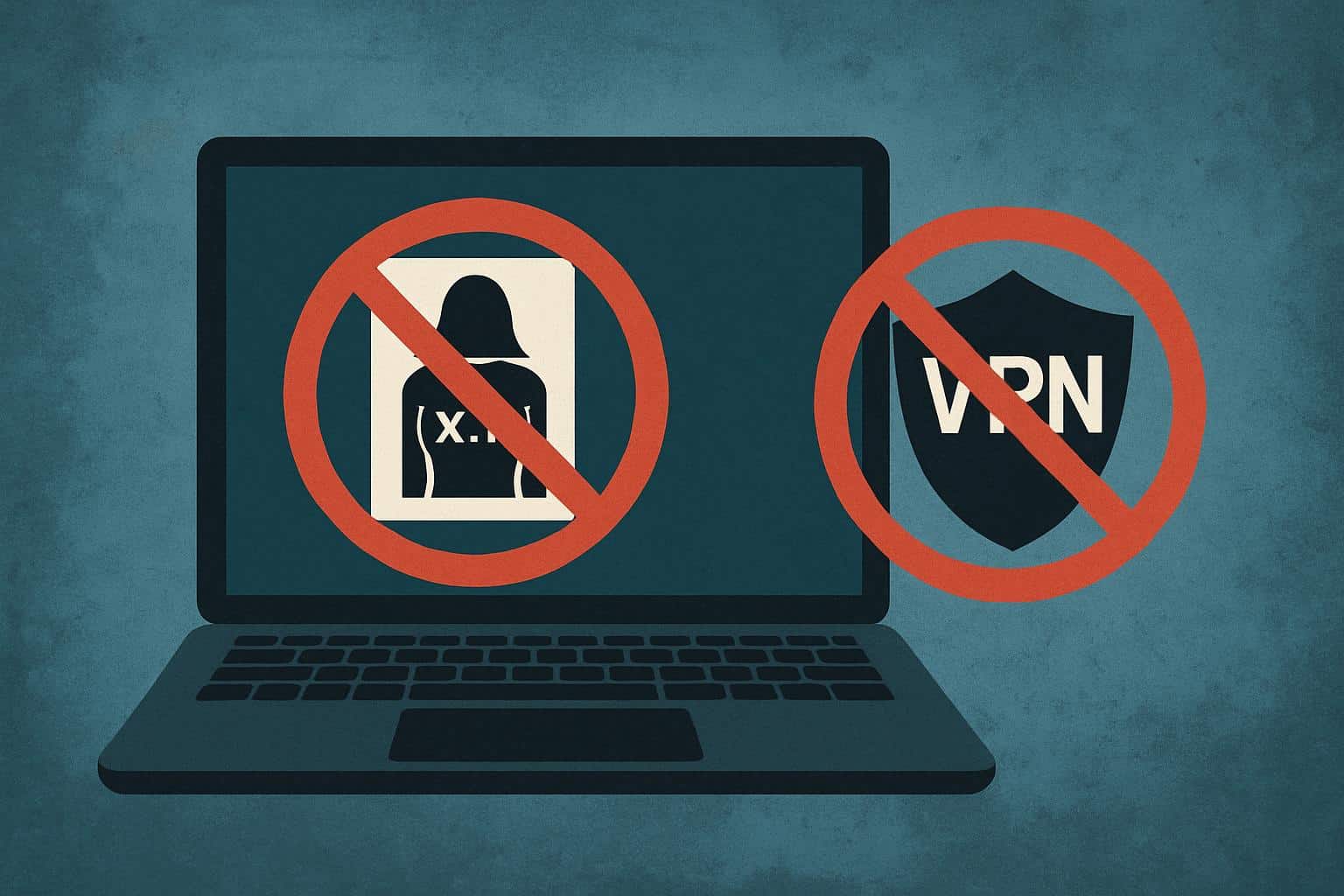Michigan lawmakers proposed a bill requiring internet service providers to block access nationwide to sexually explicit materials that depict minors, with violators of these rules potentially facing jail time. Cast by sponsors as a measure that would stint predators’ access to children, the proposal has already set off a confrontation with defenders of civil liberties and cybersecurity experts, who said it would encumber lawful speech and weaken online security for all.
What the Michigan Internet Pornography Bill Would Do
The bill, sponsored by state Rep. Josh Schriver, enacts the “Anticorruption of Public Morals Act,” which mandates that internet service providers (ISPs) block out porn websites and impose a ban on certain kinds of sexual content being produced for residents in Michigan. The text takes the widest possible definition of “porn,” including not only traditional porn but also erotica, ASMR designed to be sexual, sexually explicit manga and animation, and even AI-generated material. It also imagines hefty punishments for violators, with fines of hundreds of thousands of dollars and long prison terms.

Another provision deals with circumvention, outlawing the use of tools such as VPNs, proxies, or encrypted tunneling to evade the blocks imposed by the state. The bill also threatens to nudge social networks into updating their terms of service so that the content in question wouldn’t show up in Michigan, effectively mandating geofenced content moderation across a significant portion of the internet.
Civil rights groups say parts of the measure move well beyond obscenity and into viewpoint-based censorship, specifically a provision banning depictions about gender identity. The ACLU and LGBTQ+ advocates contend such restrictions would be both unconstitutional and impossible to enforce, sweeping up material, news, art, education, and health information along with the commercial pornography industry.
A VPN Crackdown With Widespread Collateral Damage
VPNs are designed to encrypt traffic and route it through distant servers. We use them for privacy, but they are also indispensable to modern work and security. Banks, hospitals, schools, and small businesses all use encrypted tunnels to secure data, vet employees, and satisfy compliance requirements. Most of the NIST security advice, HIPAA and financial regulations today seem to still assume/require only encrypted connections for sensitive data.
Blocking or criminalizing VPNs would thus affect much more than porn.
According to Stanford’s WFH Research, about a quarter to a third of U.S. workdays are now carried out at home; many employees rely on VPN access to their corporate resources. Cybersecurity experts caution that undermining encryption tools would increase the risk of a breach and get more expensive for insurers. As the Electronic Frontier Foundation has phrased it in analogous struggles, “a ban on encryption is a ban on security.”
The enforcement challenge is also difficult. And figuring out if someone uses an encrypted connection for work, banking, or telehealth, or simply to access the porn that their government has declared off-limits? You can’t do it unless the state employs deep packet inspection or intrusive surveillance methods — which raise their own legal and ethical red flags. Efforts in places like Russia and China to shut down VPNs have resulted in ubiquitous overblocking, as well as continuing cat-and-mouse evasion rather than outright elimination.

Free Speech, Federal Preemption and the Courts
Obscenity is not considered protected speech, but the threshold for a piece of content to be labeled obscene is difficult to meet. The Supreme Court has held that there is a three-part test, contained in Miller v. California, which considers whether the material violates community standards, whether it is obscene (i.e., appeals to prurient interest), and, if so, whether it lacks serious value. The court has also recognized, as Justice Potter Stewart famously put it some years earlier, that the line drawing is “notoriously difficult.” Laws that sweep in protected expression or single out particular points of view generally do not fare well in court.
There’s also the Dormant Commerce Clause problem. State rules that attempt to effectively regulate the internet outside its own boundaries are frequent targets of litigation, as evidenced in recent fights over age-verification laws for adult sites. In some courts, enforcement has been permitted to continue as pending challenges advance; in others, the laws have been blocked on claims that they are unconstitutional burdens on speech and privacy. In retaliation, the big adult platforms run by Aylo have already cut off access in more than a dozen states, citing the privacy dangers to user data presented by verification regimes.
Any effort to ban VPNs would likely prompt more federal preemption fights. Enterprise VPNs and encrypted tunnels are some of the basic building blocks of interstate commerce, critical infrastructure, and even national cybersecurity policy. Trade groups for ISPs and tech platforms, as well as the Free Speech Coalition and civil liberties organizations, would almost certainly quickly mount a constitutional challenge on First Amendment, Commerce Clause, and due process grounds.
Part of a Broader Policy Push Around Online Pornography
Michigan’s proposal comes as a national coalition of conservative and liberal groups, along with internet companies including Google and Facebook, backs an effort aimed at restricting minors’ access to adult content and policing how platforms are allowed to check for someone’s age. Politicians are increasingly mentioning AI-generated sex content and deepfakes as pretense for extending general control. But packaging porn restrictions with prohibitions on privacy and security tools takes the clampdown to a new level, one that would transform how residents connect to the internet rather than simply where they click.
If made into law, ISPs would be required to implement statewide filtering and geofencing systems, platforms would have to draft specific rules for Michigan-based moderation of comments, and regular users could run into routine software — say, remote-work clients or gaming services — sporadically blocked out. Decisions to pull services entirely, rather than re-engineer them for one state’s rules, will likely be easier ones for many companies to make.
What to Watch Next as Michigan Bill Advances or Stalls
The bill still faces an uncertain future, and even if enacted would almost certainly be met by immediate requests for injunctions. Plan on seeing a few familiar faces in court: civil liberties groups taking issue with overbreadth, adult-industry associations objecting to the definitions, and tech coalitions warning of national repercussions if one state can make widely used encryption tools outright illegal. Whichever way the politics play out in Lansing, the legal war over where to draw the line balancing protection of minors and communication with them on matters that their own parents know are right is only beginning.

